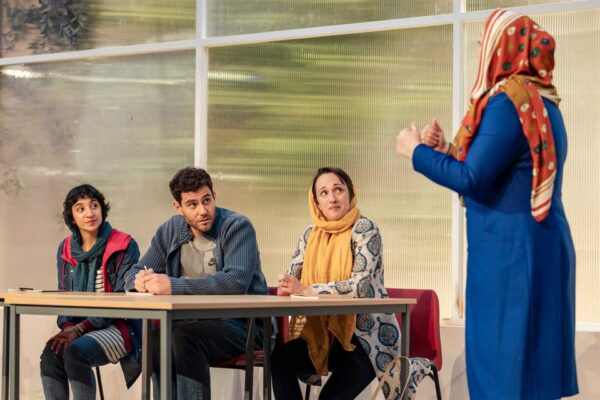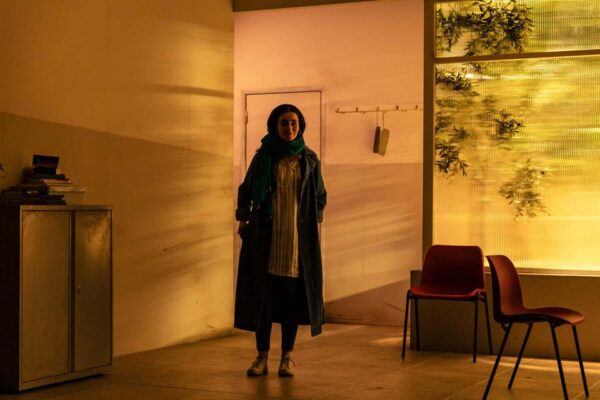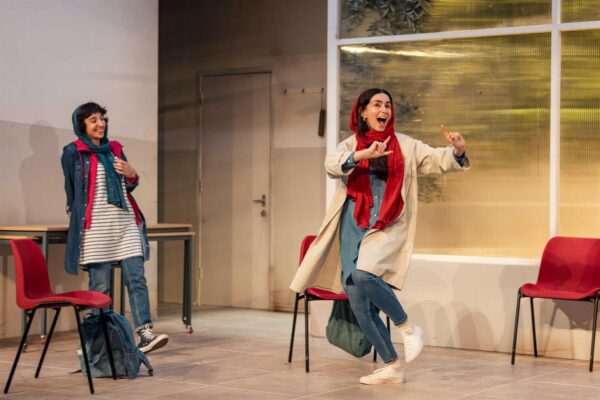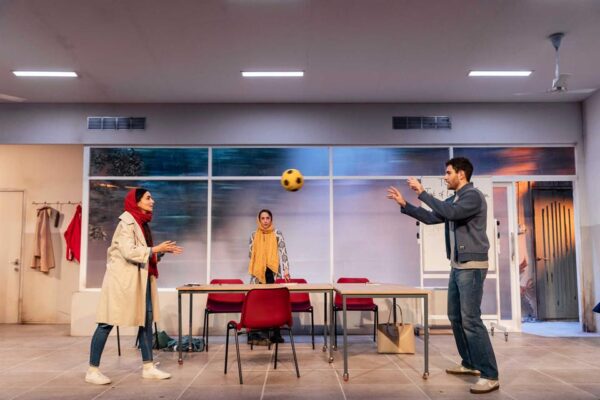PLAIN ENGLISH
The New York production of English, written by Iranian-American Sanaz Toossi, won a Pulitzer Prize for Drama in 2023. Directed by Diyan Zara, English is making its European premiere at The Other Place, RSC’s center for new writing in Stratford-upon-Avon, before moving to London’s Kiln Theatre.
It’s a quiet play’”about 100 minutes long, no intermission’”with just five characters and Alisha Fields’s single, simple set: an adult education classroom with tables, chairs, and a white board, in which four students in Karaj, Iran, in 2008 seek to learn English from one teacher, Marjan (Nadia Albina). Each student has their own reasons for learning English and each has their own distinct personality. That’s a real strength of the play.
Goli (Sara Hazemi) is young and somewhat superficial, interested in make-up and pop songs, yet Hazemi portrayed her with a diffident sunniness that made me want to know more about her. She has a face that is a pleasure to watch as she struggles to understand what it is she feels and wants to say.
Roya (Lanan Joffrey) is the oldest of the students; she is challenged not only with her efforts to learn English but with the changing nature of her relationship to her son, who is now a father to her granddaughter and living in Canada. Roya wants nothing more than to know and be known by her granddaughter, but her lack of proficiency in English is a barrier her son uses to keep his mother at a distance. Omid (Nolan Khazai) is the most proficient student and the one male. He has some very big secrets’”secrets that will eventually cost him his place in the class.
Elham (Serena Manteghi) is the most ambitious student and she seethes with anger’”anger toward Omid for speaking English better than she does, anger toward Marjan for favoring Omid, and anger toward English itself for being an obstacle to her plans to study medicine in Australia.
Marjan decrees that students can speak only English in her classroom, a rule that is broken repeatedly. Marjan tallies every infraction on her white board until the board itself becomes a point of conflict in the classroom. (Nearly all the lines are in English, but when performers speak fluently they are meant to be speaking Farsi, while their efforts at English are generally stiff and artificial sounding.)
Each character has a different feeling about English’”for Marjan, English offers a release and Goli feels taller when she speaks English. But for Roya and Elham, English is oppressive and limiting. Elham feels like an idiot when she speaks English because she is able to say so little. She fears that people who do not know her as a speaker of Farsi will not understand that she is nice, that she cares about the world. Roya is enraged that her granddaughter has been given a name she can’t pronounce. But Marjan, who spent nine years living in England, has started to feel that she is losing her English. She makes small mistakes in the course of the class, mistakes that dismay her and make her feel that she is disappearing’”that’s how important her self-image as a speaker of English is to her.
There’s a lot we never learn about Marjan, but she is the central character in this play. While other characters are defeated by or triumph over English, Marjan struggles most visibly with her own self-image and the disappointments of her life. We know she is married, but the only thing we know about her husband is that he doesn’t speak English. We know she enjoys English-language rom-coms, and we know she is susceptible to falling in love. We know she has made some choices she regrets, though we never fully understand what those choices were. We know that by the end of this play, she has learned more from her students than they have from her.
Like students learning a foreign language, we are left at the end of this play feeling that the more we learn the more we know we have to learn. But unlike studying a new language, which allows greater comprehension with continued application, we are left at the end of English with the gnawing feeling that our understanding of what we have seen would be deepened by greater insights into some of these characters and the choices and challenges they have faced.
photos by Richard Davenport RSC
English
The Other Place, Stratford-upon-Avon
ends on 1 June, 2024
for tickets, call 01789 331111 or visit RSC
then plays the Kiln Theatre
269 Kilburn High Road in London
05 June – 29 June, 2024
for tickets, call 020 7328 1000 or visit Kiln









